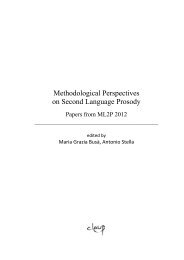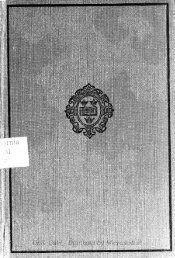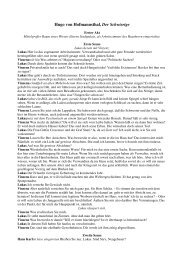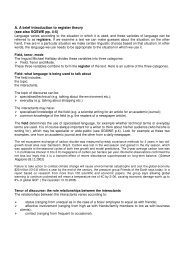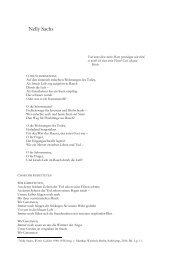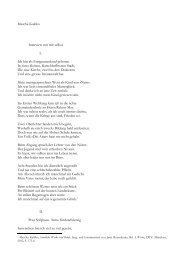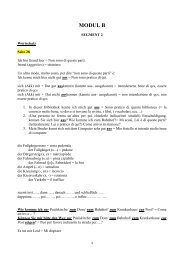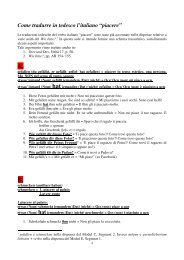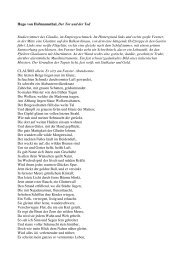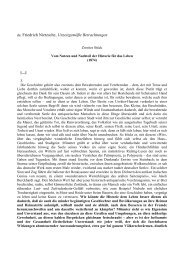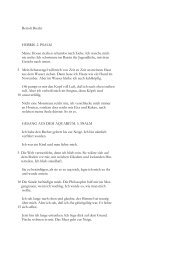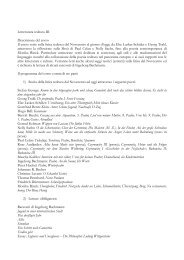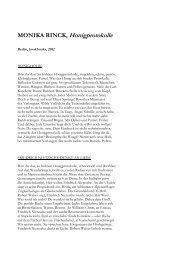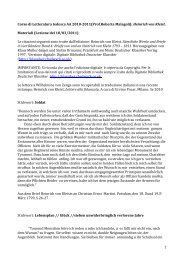1 They Never Wept, the Men of my Race: Antjie Krog's Country of my ...
1 They Never Wept, the Men of my Race: Antjie Krog's Country of my ...
1 They Never Wept, the Men of my Race: Antjie Krog's Country of my ...
You also want an ePaper? Increase the reach of your titles
YUMPU automatically turns print PDFs into web optimized ePapers that Google loves.
10<br />
Congress. 37 In his book, Verwoerd documents his own move from being what he<br />
describes as a son <strong>of</strong> Verwoerd to being a ‘son <strong>of</strong> Mandela’. Each <strong>of</strong> <strong>the</strong><br />
chapters bears a title that follows <strong>the</strong> same pattern – ‘from… to’. The English<br />
language edition includes a foreword by Nelson Mandela, whose signature at <strong>the</strong><br />
end <strong>of</strong> his letter in support <strong>of</strong> <strong>the</strong> book is reproduced – as a seal <strong>of</strong> <strong>the</strong> author’s<br />
association with him. The book includes a photograph showing <strong>the</strong> author<br />
meeting <strong>the</strong> President. Near <strong>the</strong> end <strong>of</strong> <strong>the</strong> book Verwoerd reports a fight<br />
between his infant children and some friends: each one wants to be Mandela in<br />
<strong>the</strong> game <strong>the</strong>y are playing. In <strong>the</strong> way Verwoerd presents his relationship to<br />
Nelson Mandela, it is as if <strong>the</strong> next generation have made <strong>the</strong>ir entry into <strong>the</strong> new<br />
world, where <strong>the</strong> name <strong>of</strong> <strong>the</strong> fa<strong>the</strong>r is Mandela not Verwoerd.<br />
Yet Verwoerd’s decision to vote for <strong>the</strong> ANC, and his wife’s election as an ANC<br />
Member <strong>of</strong> Parliament, is never dissociated from <strong>the</strong> name Verwoerd. Melanie<br />
Verwoerd belongs to a generation <strong>of</strong> women who need not take on <strong>the</strong> name <strong>of</strong><br />
<strong>the</strong> husband, or <strong>the</strong> husband’s fa<strong>the</strong>r; yet for both <strong>of</strong> <strong>the</strong>se young Afrikaners <strong>the</strong>ir<br />
choices take on added power, acting as <strong>the</strong>y do against <strong>the</strong> backdrop <strong>of</strong> <strong>the</strong><br />
Afrikaner genealogy. Metaphors <strong>of</strong> new beginnings and birth abound in Wilhelm<br />
Verwoerd’s text, which reads in many ways like a conventional religious<br />
conversion narrative. The old life is left behind, <strong>the</strong> development <strong>of</strong> <strong>the</strong> new life<br />
is charted, and <strong>the</strong>re is a dramatic break between <strong>the</strong> old and <strong>the</strong> new. In <strong>the</strong><br />
conversion narrative, <strong>the</strong> past is not revisited fondly; for <strong>the</strong> children <strong>of</strong> Verwoerd<br />
<strong>the</strong> past also remains a country to which <strong>the</strong>re is no return.<br />
<strong>Antjie</strong> Krog’s text speaks <strong>of</strong> this rebirth in more complex ways. Her text exhibits<br />
a high degree <strong>of</strong> self-doubt and an acute awareness that a new identity for white<br />
South Africans may only be possible, provisionally, at certain moments. She<br />
writes:<br />
In <strong>the</strong> beginning it was seeing. Seeing for ages, filling <strong>the</strong> head with ash.<br />
No air. No tendril. Now to seeing, speaking is added and <strong>the</strong> eye plunges<br />
into <strong>the</strong> mouth. Present at <strong>the</strong> birth <strong>of</strong> this country’s language itself.<br />
And it wipes us out. Like a fire. 38<br />
Significant in this section <strong>of</strong> her book is <strong>the</strong> sense <strong>of</strong> a new beginning, linked to<br />
witnessing and testifying: first sight, <strong>the</strong>n speech develops. And this<br />
development that is tracked is that <strong>of</strong> ‘this country’s language itself’. The<br />
language <strong>of</strong> this country – a language that articulates what has been seen, and<br />
names <strong>the</strong> Afrikaner violators, she writes, ‘wipes us out’. This wiping out can be<br />
understood in a number <strong>of</strong> ways; <strong>the</strong> reading that seems to be supported by <strong>the</strong><br />
rest <strong>of</strong> <strong>the</strong> text would be that <strong>the</strong> ‘we’ being wiped out here is an Afrikaner identity<br />
that is able any longer to contain <strong>the</strong> author. Her past, her alliance, her<br />
37 Verwoerd, My Winds <strong>of</strong> Change, p. 3.<br />
38 Krog, <strong>Country</strong> <strong>of</strong> <strong>my</strong> Skull, p. 29.



